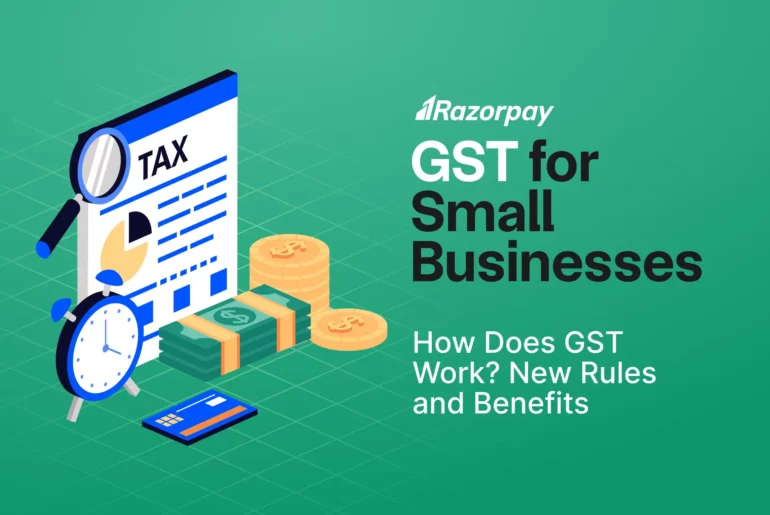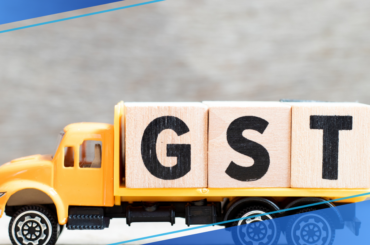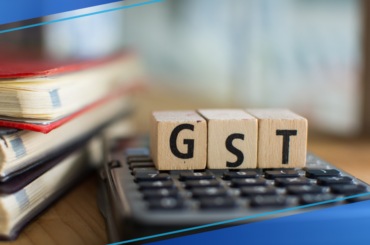The Goods and Services Tax helps small businesses get rid of complex and legacy centre and state taxation systems and replacing them with a simple, unified one tax system.
Read More: What is Goods and Services Tax (GST) and how does it work?
Table of Contents
GST For Small Business
Yes, Registration for GST as a small business is mandatory if you are a supplier of goods with an annual turnover exceeding Rs 40 lakh. Turnover limit for GST registration of a small business as a supplier of goods is Rs 20 lakh in the States of Arunachal Pradesh, Manipur, Meghalaya, Mizoram, Nagaland, Puducherry, Sikkim, Telangana, Tripura, and Uttarakhand.
In the services sector, businesses with turnover of more than Rs. 20 Lakhs should mandatorily register for GST. Turnover limit for GST registration of a small business as a provider of services is Rs 10 lakh for the States of Manipur, Mizoram, Nagaland, and Tripura.
A GST composition scheme has been introduced under GST for small businesses operating in India. This scheme provides for a lower amount of tax for businesses having turnover up to Rs 1.5 crore in a year.
Check out Razorpay’s GST Search Tool, a powerful resource designed to streamline GST verification and search for Central and State GST jurisdiction.
How GST Helps Startups and Small Businesses?
Tax credit on purchases
A lot of startups in India are a part of the service industry. Prior to GST, they had to collect and pay service tax to the government. Non-utilization of the VAT paid on purchases made for business purposes was one of the primary concerns. There was no provision for claiming the credit of state VAT paid against the service tax liability.
Startups can now set off tax paid on the purchases (for example, office supplies) with the tax paid on their sales under GST.
Related Read: How to Sell Online Without GST Number in India?
Pre-GST Example of VAT
A startup buys office supplies worth Rs 50,000 paying 5% VAT on the same. It provides a service to another company for Rs 80,000 on which service tax of 15%. Let’s see the calculation of taxes to be paid by the startup when no adjustment of VAT and service tax was allowed:
| Service tax paid on service provided (80,000*15%) | 12,000 |
| VAT paid while purchasing office supplies (50,000*5%) | 2,500 |
| Total indirect tax paid | 14,500 |
2. Post-GST Example of Tax Credit on Purchases
The startup buys office supplies worth Rs 50,000 (GST @ 12%) and has provided a service to another company for Rs 80,000 (GST @ 18%). Here’s how the startup can enjoy the credit of the taxes paid on purchases after the introduction of GST:
| GST on service provided (80,000*18%) | 14,400 |
| Less: GST paid while purchasing office supplies (50,000*12%) | 6,000 |
| Net GST to be paid | 8,400 |
Calculate GST inclusive and exclusive prices for your goods with the GST Calculator.
The Impact of GST on Small Businesses & Startups
1. Ease of Logistics for Small Businesses
Logistics involves moving goods from origin to consumption. Before GST, the industry grappled with complex taxes, multiple warehouses, and delayed movement, all addressed by GST.
No need to maintain multiple warehouses
The GST for start-ups has removed the need to maintain multiple warehouses across states, as there is no inter-state tax on the movement of goods. This enabled logistics players to consolidate warehouses, optimise storage, and cut inventory and maintenance costs while enhancing warehouse management.
Elimination of check posts, tolls and border inspections
The GST for small businesses has eliminated the check posts, tolls, and border inspections that caused delays and corruption in the inter-state movement of goods. This has reduced transportation time and logistics costs and increased operational efficiency and customer satisfaction. The GST number for online businesses has also allowed the free movement of goods across states without any restrictions or barriers.
2. Tax burden for manufacturing startups
Under the previous excise laws, only manufacturing businesses with a turnover exceeding Rs 1.50 crore had to pay excise duty. However, under GST, the turnover limit has been lowered to Rs 20 lakh, thus increasing the tax burden for many manufacturing startups. This change has posed some challenges for startups, as they have to adjust to the new tax regime and comply with the GST rules and regulations.
Advantages of GST for Startups
- Reduced cascading effect of taxes, as GST eliminates the multiple taxes levied at different stages of production and distribution.
- As already discussed, it improved logistics and transportation.
- Enhanced competitiveness and efficiency, as GST creates a level playing field for the domestic manufacturers and reduces the compliance burden.
Some Hurdles for Startups
- Higher working capital requirement, as they have to pay GST upfront on inputs and claim input tax credit later.
- Increased compliance cost, as they have to file monthly returns and maintain detailed records of their transactions.
- Lack of clarity and awareness about the GST provisions and procedures, especially for small and medium enterprises.
3. Reduction in Compliance Cost for Businesses
A key GST benefit is simplifying taxes by merging multiple levies into one system. This reduces businesses’ complexities and ambiguities, especially startups and small enterprises, which must deal with different tax rates and regulations across various states and sectors. Reducing compliance costs is a significant advantage for startup businesses and entrepreneurs, who can now concentrate more on their core activities and innovation.
Startups and small businesses no longer need to navigate multiple tax departments, streamlining the process of filing tax returns and claiming input tax credits. This also reduces the risk of tax evasion and corruption, enhancing the transparency and accountability of the tax system.
However, businesses may struggle with understanding GST rules, including goods/services classification, tax calculation, and registration/return filing. Patience is key as GST is complex, but compliance improves with familiarity.
4. Ease of Doing Businesses with Single Registration
Another GST advantage is streamlined registration. Businesses can now register under a single authority, eliminating repeated registrations across states. This simplifies operations for startups, who can operate nationwide with a single registration number and tax return. The single registration system reduces complexities, paperwork duplication, and compliance costs, allowing startups to expand their customer base in the common market.
Simple Procedure for GST Registration and Filing Tax Returns
GST registration and filing returns under GST is online, making it not only simple but also extremely quick. If all the documents are handy, then obtaining a registration number is just a few clicks away.
Cash-strained startups stand to gain many financial benefits thanks to the implementation of GST. With a much higher threshold for GST registration for startups, tax credits on purchases, and ease of processes, GST has brought relief to smaller companies in India.
Online simpler procedure under GST
Online GST registration has made the tax compliance process simpler and more efficient for startups, enabling them to focus on their core business activities.
Here is how:
-
- Under GST, startups register, file returns, and pay taxes online, simplifying processes and eliminating the hassle of dealing with multiple tax authorities and rates.
- Another benefit of GST for small businesses is that it allows startups to claim input tax credits on their purchases, which reduces their tax burden and improves their cash flow. Moreover, it has eliminated the need for multiple registrations, as startups can operate across states with a single GST registration number. This makes it easier for startups to expand their business and reach new customers.
- In the recent GST Council meeting, small taxpayers got some relief as late fees for filing GSTR-1 and GSTR-3B were waived off.
Related Read: GST Registration Limits: Threshold limit for GST Registration for 2025
Offences and Penalties under GST for Evading the New GST Rules
| Type of offence | Amount of penalty |
| Penalty for not registering under GST | Penalty 10% of the tax due or Rs 10,000 whichever is higher |
| Penalty for not issuing invoices | |
| Penalty for not filing GST returns | |
| Penalty for committing a fraud | |
| Penalty for delay in filing GST returns | Late fee is Rs 100 per day under the CGST Act & Rs 100 under the SGST Act. So, a total penalty of Rs 200/day will apply up to a maximum of Rs 5,000. |
| Penalty for opting for composition scheme even though the business is not eligible | In case of fraud (Section 74), a penalty of 100% of the tax due or Rs 10,000 whichever is higher will apply
In case of no fraud, a penalty of 10% of the tax due or Rs 10,000 whichever is higher will apply |
| GST rate “}”>Penalty for wrongfully charging a higher GST rate | Penalty 10% of the tax due or Rs 10,000, whichever is higher (if the additional GST collected is not submitted with the govt) |
| Penalty for wrongfully charging lower GST rate | Interest @18% p.a. will be applicable on the GST shortfall |
| Penalty for incorrect filing of GST returns | |
| Penalty for incorrect invoicing | Penalty of Rs 25,000 |
| Penalty for incorrect type of GST charged (IGST instead of CGST/SGST) | No penalty will be charged in this case. Businesses can pay the correct GST and get a refund of the wrong GST paid earlier |
Related Read: What is the Difference Between CGST, SGST and IGST
How can startups make the invoicing process much easier?
The answer to this is Razorpay GST Invoices, a smart product to help you generate GST-compliant invoices in a matter of minutes.
You can use this product by following three simple steps:
1. Create the invoice
The easy-to-use platform allows you to create multiple invoices with total ease. You just have to enter the details of goods supplied, or services provided, along with the value and the GST applicable. Once you click on the create invoice button, the platform will generate the same, ready for use.
2. Notify your customer
After the GST-compliant invoice is created, you can send the invoice’s unique link to your customers via an SMS or email.
3. Receive your payments
Your customers can then immediately initiate a transaction to make the payment.
Additionally, your customers can also download the invoice and save it for future reference. If you want to initiate partial payments on an invoice, that can also be carried out transparently to ensure all your business processes are followed correctly.
The Razorpay dashboard not only shows you the invoices that have been sent and cleared but also shows you valuable consumer insights that can come in handy while crafting your business strategies.
Read More: How to Create GST Invoice: Format and Rules
FAQs
Is GST required for small business?
Yes, all small businesses must register for GST under the GST Act they are a goods manufacturer with an annual turnover of over Rs. 40 Lakhs or if they are a service provider with an annual turnover of over Rs. 20 Lakhs.
2. Are startups exempted from GST?
Startups are exempted from GST if their annual turnover is less than the threshold limit of Rs. 40 lakhs for goods and Rs. 20 lakhs for services or if they are engaged in the supply of exempted goods or services.
3. Is GST mandatory for startups?
GST is mandatory for startups if their annual turnover exceeds the threshold limit or if they are involved in inter-state supplies, e-commerce transactions or reverse charge mechanisms.
4. How do startups get tax-exempt?
Startups can get tax-exempt under the Startup India initiative if they are recognised by the DPIIT and meet the eligibility criteria for tax benefits. These include a 3-year tax holiday, exemption from long-term capital gains tax, and exemption from tax on investments above the fair market value.
5. What is the GST turnover for small businesses?
40 Lakhs for goods and Rs. 20 lakhs for services are required to register for GST and pay taxes on goods and services. Businesses with an yearly turnover of less than Rs. 40 Lakhs are not required to register for GST, but can voluntarily register for GST under the GST Act, 2017.






2 Comments
Hi,
Does one need to register for GST if you sell online ONLY on OWN website and not on Amazon, Flipkart, etc
Please clarify.
Thanks
Hi Karan,
Yes, you have to register for GST even if you are selling online through your own website. Read this to know more: https://razorpay.com/learn/gst-registration-eligibility-procedure-documents-and-penalties/